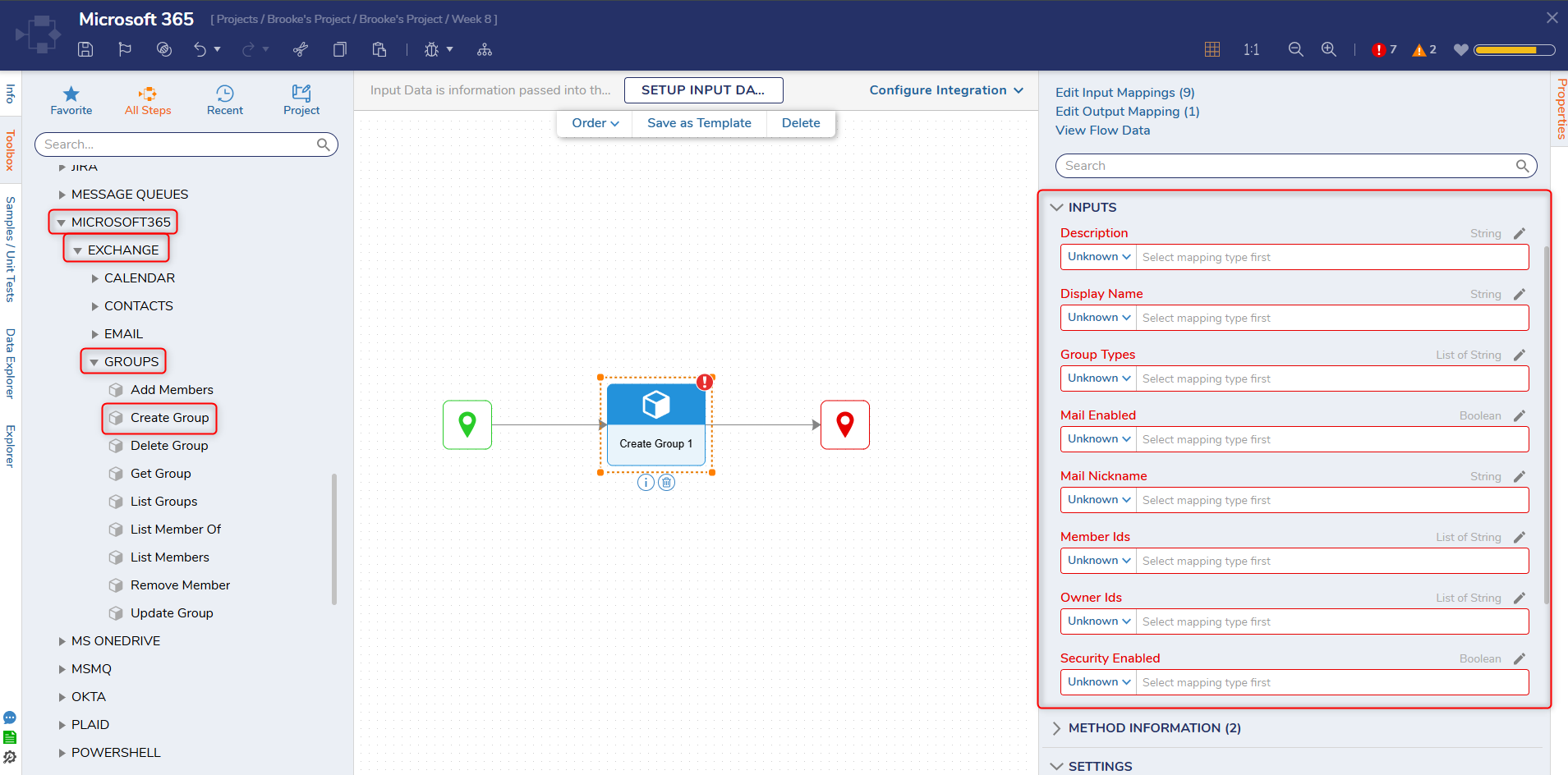| Step Details | |
| Introduced in Version | 4.0.0 |
| Last Modified in Version | 9.10.0 |
| Location | Integration > Microsoft365 > Exchange > Email |
The Create Group step creates a group to a connected Microsoft365 Exchange account.
Prerequisites
- This step requires the Microsoft 365 Exchange module to be installed before it will be available in the toolbox.
- A dependency must be created after installing the module in order for the the steps to be properly used.
Properties
Inputs
| Property | Description | Data Type |
|---|---|---|
| Description | Description of new group. | String |
| Display Name | Display name of the new group. | String |
| Group Types | List of the type attributes to assign to the new group. | List of String |
| Mail Enabled | Toggle to permit the ability to enable mail. | Boolean |
| Mail Nickname | Nickname of mail. | String |
| Member Ids | List of IDs for members of the new group. | List of String |
| Owner Ids | List of IDs of owners of the new group. | List of String |
| Security Enabled | Toggle permitting security enablement. | Boolean |
Settings
| Property | Description | Data Type |
|---|---|---|
| Settings Override | Optional settings to override default OAuth token. | InputExchangeSettings |
Outputs
| Property | Description | Data Type |
|---|---|---|
| Output | Outputs completed step information. | Microsoft365Group |

Common Errors
Data Not Mapped Correctly
If the inputs are incorrectly formatted, the step will cause an error.
To correct this, input valid inputs to permit proper orderly operations.
Exception Message:
Exception Stack Trace: DecisionsFramework.Design.Flow.ErrorRunningFlowStep: Error running step Substring 1[Substring] in flow [Display Steps]: Exception invoking method Substring on class StringSteps
---> DecisionsFramework.LoggedException: Exception invoking method Substring on class StringSteps
---> System.ArgumentOutOfRangeException: Index and length must refer to a location within the string. (Parameter 'length')
at System.String.Substring(Int32 startIndex, Int32 length)
--- End of inner exception stack trace ---
at DecisionsFramework.Design.Flow.StepImplementations.InvokeMethodStep.Run(StepStartData data at DecisionsFramework.Design.Flow.FlowStep.RunStepInternal(String flowTrackingID, String stepTrackingID, KeyValuePairDataStructure[] stepRunDataValues, AbstractFlowTrackingData trackingData)
at DecisionsFramework.Design.Flow.FlowStep.Start(String flowTrackingID, String stepTrackingID, FlowStateData data, AbstractFlowTrackingData trackingData, RunningStepData currentStepData)
--- End of inner exception stack trace ---The Request Was Unsuccessful.
If the token defined cannot be used to access Microsoft Exchange, the step will cause an error.
To correct this, ensure a correct and valid OAuth token has been established.
Exception Message:
DecisionsFramework.BusinessRuleException: [BusinessRule] The request was unsuccessful. ---> System.Net.Http.HttpRequestException: Response status code does not indicate success: 401 (Unauthorized).
at System.Net.Http.HttpResponseMessage.EnsureSuccessStatusCode()
at Decisions.Microsoft365.Exchange.GraphRest.SendHttpRequest(ExchangeSettings settingsOverride, String url, HttpContent content, HttpMethod httpMethod)
--- End of inner exception stack trace ---
at Decisions.Microsoft365.Exchange.GraphRest.SendHttpRequest(ExchangeSettings settingsOverride, String url, HttpContent content, HttpMethod httpMethod)
at Decisions.Microsoft365.Exchange.GraphRest.CreateHttpRequest(ExchangeSettings settingsOverride, String urlExtension, HttpContent content, HttpMethod httpMethod)
at Decisions.Microsoft365.Exchange.GraphRest.HttpResponsePost(ExchangeSettings settingsOverride, String urlExtension, HttpContent content)
at Decisions.Microsoft365.Exchange.GraphRest.Post(ExchangeSettings settingsOverride, String urlExtension, HttpContent content)
at Decisions.Microsoft365.Exchange.Steps.ExchangeCalenderSteps.CreateCalendarEvent(Microsoft365CalendarEvent microsoft365CalendarEvent, String userIdentifier, String calendarId, InputExchangeSettings settingsOverride)
at System.RuntimeMethodHandle.InvokeMethod(Object target, Void** arguments, Signature sig, Boolean isConstructor)
at System.Reflection.MethodBaseInvoker.InvokeDirectByRefWithFewArgs(Object obj, Span`1 copyOfArgs, BindingFlags invokeAttr)Related Information
Related Articles:
Exchange Web Services Module